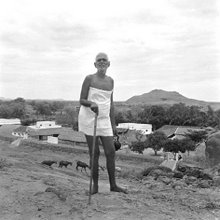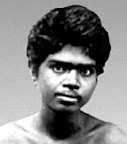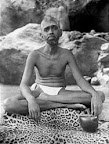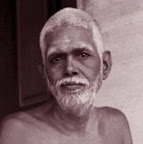ONE year passed by, life went on as usual. In 1895, Nelliappa Iyer left Tiruchuzhi for Manamadurai where he settled down as a secondry grade pleader. In the summer of 1896 both Venkataraman and his brother visited the place.
In 1896, Nagaswami married Janaki Ammal. His in- laws also lived in Madurai. Venkataraman was in his seventeenth year and in his tenth standard, preparing for the public examination. Though not quite studious he had no fear of the examination. He enjoyed games which made him robust and healthy. It was mid-July. One afternoon, Venkataraman was lying in the first floor room when, for no apparent reason, he had a sudden fright that he would die; "I am dying," he thought. Years later, Bhagavan narrated the experience in the following manner ?
"There was no reason for me to think like that. I did not even know what that state was nor why I was afraid. It did not occur to me that I should consult either a doctor or some elders. The only problem for me was what death meant and how it could be avoided. I resolved to solve it at once. Death meant that the limbs stiffened, lips tightened, eyes closed and breath stopped. By intense thinking, all this came to be experienced. But neither memory nor awareness disappeared. In other words, the sense organs ceased to operate externally and an inward look established itself. Even if the body died, the sense of `I' did not go. The consciousness of individuality was very much there. When the body was taken to the graveyard and reduced to ashes `I' did not perish because `I' was not the body.
"The body was inanimate and without knowledge but I had knowledge. Therefore death was for the inanimate body whereas `I' was imperishable and was consciousness.
"The knowledge one had when the body and senses ceased to function was not the product of the senses. The awareness of `I' was direct, self luminous and not a product of any thought. The entity which survived death was consciousness."
Thus in a trice, Venkataraman had new knowledge. Though the experience was described step by step, it all happened in a flash. With neither the guidance of a guru nor any abhyasa, did any other yogi obtain that knowledge?
The Bhagavad Gita says: manusyanam sahasresu kascid yatati siddhaye! Yatatam api siddhanam kascin mam vetti tattvatah (vii.3) (Among thousands of men scarcely one strives for perfection and of those who strive and succeed, scarcely one knows Me in truth)
— Tr. Swami Chidbhavananda
That knowledge is unprecedented. Such a person is born with a purpose, he is an avatar and a teacher.
About the knowledge of the Atman, Katha Upanishad says:
Nayamatma pravacanena labhyo na medhaya na bahuna srutena Yamevaisa vrnute tena labhyah tasyaisa atma vivrnute tanu svam-
(2.23)
(This Atman cannot be attained by study of the scriptures, nor by sharp intellect, nor by much hearing; by him is It attained whom It chooses — to him this Atman reveals Its Own true form).
— Tr. Swami Rangananthananda
It is entirely appropriate that this miraculous event should occur at the seat of the consort of Siva and the source of all, Sakti Meenakshi. The Bhagavad Gita says that para-prakriti sakti dispels all ignorance. Ramana became Self aware by the grace of the divine power. Madurai is reputed as the dvadasanta mahasthali. (the place of the presiding Deity of the twelve sources of power, the chakras.)
By his direct perception Venkataraman had a re-birth and by his knowledge he attained moksha [?] — simultaneously. He realized he was the imperishable "Aham." All fear of death left him.
Much later Bhagavan was to say in Ulladu Narpadu (Reality in Forty Verses), "When those who are in dread of death seek refuge at the feet of the deathless, birthless Lord Supreme, their Ego and Attachments die and they, now deathless, think no more of death."
— Tr. K. Swaminathan
Referred Resources:
Reality in Forty Verses
Tiruchuzhi
Links to rl:
Nelliappa Iyer: (Chapter 16: Victorious Yoga)
1895: (Chapter 4: The Dawn)
1896: (Chapter 10: The Great Journey)





No comments:
Post a Comment